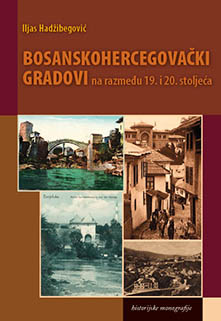
We kindly inform you that, as long as the subject affiliation of our 300.000+ articles is in progress, you might get unsufficient or no results on your third level or second level search. In this case, please broaden your search criteria.

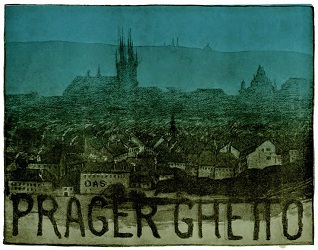
This is 1903, a time when the word „Ghetto“, particularly in Jewish context, already may have sound slightly pejorative, but had no connotation yet as it got few decades later through Shoah. This is a book providing a portrait of the urban quarters and places of Prague formed and characterized by the Prague Jewish life. // A CEEOL-"Digsimile" (digital Faksimile) of the original, published in 1903 by the VERLAGSBUCHHANDLUNG DER BÖHM. GRAPHISCHEN GESELLSCHAFT „UNIE“ IN PRAG. The Digsimile of the original illustrated book can be used for citation as if you would cite an extract from the original (pagination is the same).
More...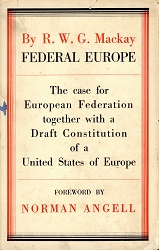
First published in 1940 (London) by Michael Joseph Ltd. Publisher. // „This book has been written, as the reader will readily realise, in the all too scanty leisure of a very busy professional life. As a lawyer with some knowledge and experience of the federal systems in Australia and America I have felt for some time that I should like to make an early contribution to the discussion of this very important subject. I always think that when any proposals are to be made, whether for a business arrangement, a merger or a piece of social reform, they can be much better understood and appreciated when they are reduced to the form of a draft agreement or a draft bill. A legal document, for all the terrors it arouses, has a shape which is at once concrete, definite and specific. In the case of the federal idea, therefore, I have attempted to translate the concept of a Federal Europe into the draft Constitution of a United States of Europe, with all the detail and paraphernalia which a federal Constitution involves. Such a course has obvious disadvantages. In drafting a Constitution, one must put forward a complete scheme, naming the countries which are to join the Federation, and describing the nature of the machinery of government. No one can be certain to-day which countries will exist at the end of this war, and any scheme of Federation for Europe will be the work of many hands. However, the Constitution has been drafted, so as to be of some practical assistance to those interested in this important question.“ (author’s introduction)
More...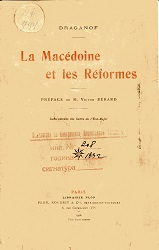
Published in 1906 by Librairie Plon in Paris. // Authors preface: "This is the full story of Macedonia and the reforms over the past ten years: on the one hand, the suffering and heroic struggles of the Macedonian people; on the other hand, the desperate efforts of the Sultan to keep under the knife this people which his brothers of Bulgaria, Serbia, Rumania and Greece civilized by the schools, but which they are unable to deliver by arms, less for lack of a military power, which would induce the end of the Ottoman rule, than for lack of a diplomatic agreement, which would combine all the interests and all the efforts in the service of civilization and liberty."
More...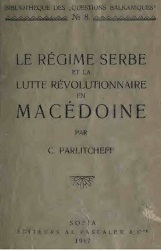
Published in 1917 by Pascalew Publisher in Sofia in the series „Bibliothèque des "Questions balkaniques", printed by the Royal Printing Press. // The author: A large number of scholars, travelers, geographers, ethnographers, historians and European publicists from both opposing camps have spoken out, during the last century and before the Balkan wars, on the ethnographic character of Macedonia. Almost all come to the conclusion that Macedonia is a country inhabited mainly by Bulgarians (in addition to Turks and Jews). The Ottoman Imperial Firman which sanctioned the restoration of the Bulgarian National Church, as well as international solemn acts, such as the Conference of Ambassadors in Constantinople, the Treaty of San Stefano and that of Berlin - confirmed this great truth. // Without dwelling on this question, we had to note this fact incidentally by exposing the factual situation, as it was under the Serbian regime and during the revolutionary struggle of the population in Macedonia during the period which embraces the end of the year 1912, when the Serbs had occupied the country, until the end of 1915, when the latter, having lost their former territory, had even had to abandon Macedonia. // Indeed, what did Macedonia represent when the Serbs, albeit for a period of three years, were the masters in this country?
More...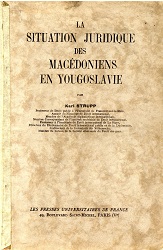
Published in 1929 by LES PRESSES UNIVERSITAIRES DE FRANCE (Fontenay-aux-Roses). // Author’s resumé : Be that as it may: From all of the above, it emerges in my personal opinion, after studying a whole literature that I have examined, that the nationals of Yugoslavia, from Macedonia which became Serbian- Croatian-Slovenian, constitute, within the meaning of the Minority Treaty of September 19, 1919, an ethnic minority. They are distinguished, from an objective point of view, first of all by their history, which, often common, never materialized in the sense of a more intense feeling, and never constituted a simple relation between victors and vanquished, that precisely the situation of the Macedonians fugitives in Bulgaria is the same as that of the partisans of the O.R.I.M., in Yugoslavia. These nationals differ by language. The latest scientific research, by M. Weigand (183) (perhaps the current best connoisseur of Macedonia), and others as well, have given convincing proof of this. From their investigations it emerges that, while the Serbs know neither the article nor the variation, it is the Macedonians who, like the Bulgarians, make extensive use of it. If on the other hand, famous Serbian scholars, for example the geographer M. Cvijic, wanted to incorporate the Macedonians in Serbia, it is because they celebrate, like these, "Slava". But we must not lose sight of the fact that many peoples have accepted the custom of the Christmas tree, without anyone concluding that they are of Germanic nationality.
More...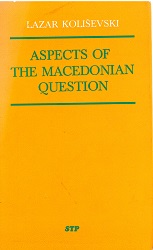
This book contains only some of the speeches, articles and statements by Lazar Koliševski published in his first book in the Macedonian language (which has seen three editions). Despite this limitation, we believe that the reader will become well acquainted with the historical past of the Macedonian people, the Yugoslav policy on the national question and the Yugoslav views on relations with its neighbouring countries. All this, it is hoped, may contribute to a better understanding of the present-day Yugoslav reality. (the editorial introduction)
More...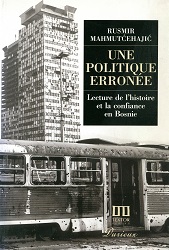
The world order constitutes, it is true, the environment in which the Bosnian state, after it had been internationally recognized, was brought to its destruction, but this only where the aggressors achieved it, having been confronted to unexpected resistance from Bosnian forces from within. The analysis of this situation therefore also represents a definition and interpretation of its logic model on a global scale. The events in question bear witness to the intention to destroy Bosnia by all means, including the total annihilation of the Bosnian being, through extermination and genocide. Their consequences today can be summed up as follows: the Bosnians survived only where they defended themselves, and the state of Bosnia, for the sole reason that the aggressors failed to break down the relentless resistance and unexpected from those whose disappearance they had programmed. The effects of this destruction have brought to light the enigma posed by the character of the Bosnian struggle for survival. We would like to give to the whole of this resistance, both outside and inside, a content that would not be Bosnian, in order to reduce the idea of the protection of the Bosnian state to just one of its components, thus confirming the deformation and degradation of the Bosnian being himself. // PUBLISHED IN 2005 BY DURIEUX PUBLISHING HOUSE BASED IN ZAGREB
More...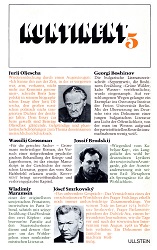
Wassilij Grossman — From the second part of the novel "For the just cause" // Georgi Boshinov — Green forests, cold water // Jossif Bogoras — The cell spike (novel) Part one // Wladimir Maramsin — The horse with two heads // Boris Jampolskij — Long live the world without me — to Jurij Oljescha // Jurij Oljescha — Liompa — Love — From "Not a day without a line" // Andrej Sinjawski — Promenades with Pushkin. Excerpts // Jossif Brodskij Lullaby from the Cod Cape. Poem // Josef Smrkovský — The unfinished conversation // Yevgeny Ternowskij — The dark face of Gogol // From the editors — Conversation with Eugene Ionesco
More...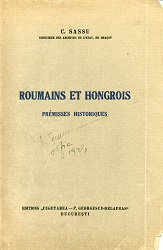
The economic crises, political tensions and troubled situations which have afflicted humanity during these last two decades since 1918, would be due, to a large extent, to the layout of these borders considered as artificial, because of them, we would have abolished consolidated units. And the course of these borders would have been made by force and by surprise i by force, because we would have imposed by violence conditions impossible on an adversary without the right of reply or of explanation, and, by surprise, by deceiving good faith of certain statesmen completely ignorant of the real situation in these regions. // As the current border between Hungary and Romania is also disputed with a great deal of passion by this development, which seems to assume that continually repeated assertions end up being accepted as true, by the mere fact of their being uttered, this work is confined to the subject proposed and aims to explain, as far as possible, the real value of these statements. We hope that minds not blinded by passion and disinterested, will find it useful and opportune to know the real elements of a controversy so ostentatiously stirred, and presented as one of the great unresolved political problems of the present time. // Published in 1940 by Editions „Cugetarea—P. Georgescu-Delafras, Bucharest
More...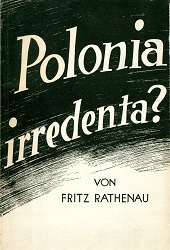
Only the Prussian constitution of 1848 made the Poles living in Prussia Prussian citizens; they had "no longer to be regarded as Prussian Poles, but as Polish Prussians". The legal situation that was created at that time has fundamentally not changed over the past decades. However, general legal understanding has progressed over time. In particular, the international treaties that ended the World War created the concept of "national minorities" and introduced it into practical politics. The "national minorities" of Prussia and, thus, of the German Reich include those German Reich or Prussian nationals who are willing to preserve and cultivate their own and unique Polish nationality in the foreign state association - according to descent, customs, customs and traditions and to continue to exist within it as a nationally united Polish community. In terms of constitutional law, the Polish minority in Prussia can only be described as “Polish Prussians” in the sense of Prussian nationals of Polish origin. Anyone who possesses Prussian or German nationality — possession of which is a conceptual prerequisite for someone being able to count themselves among the national minorities in Prussia or Germany — cannot at the same time be “Pole”, i.e. non-German; On the other hand, anyone who is Poles, i.e. foreigners, does not belong to the national minority and therefore cannot derive any rights from this characteristic. "Member of a minority" and "foreigner" are two mutually exclusive terms: Every member of the minority is also a citizen of the state in which he resides. A “Prussian Pole” could therefore not exist in itself: because a “Pole” living in Prussia cannot also be a “Prussian” as a foreigner! The antithesis: "Prussian Poles or Polish Prussians?" is therefore legally unfounded and untenable.
More...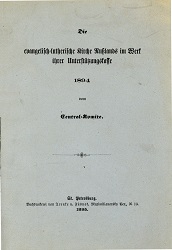
ORIGINAL PREINTED IN GERMAN FRACTURA FONT: PLEASE MAKE SURE YOU’LL BE ABLE TO READ (see Introduction.pdf) Published in 1895 by the Central Committee of the Russian Lutheran Church // From the introduction: In the last two years, it is primarily the Estonian and Livonian parish Augmentaioln Funds that have been incorporated into our administration - because they serve similar purposes to our Support Fund. In Reval, two foundations with special provisions were also handed over to the district committee. All in all, this amounts to more than 100,000 rubles, by which the annual bill is now larger. This deceives the eyes of the uninitiated and they will draw false conclusions. It is in keeping with the spirit of the Gospel not to collect treasures or accumulate capital; for we should not place our trust in money, but in the spirit as the true comforter. Hence, the Central Committee doesn’t set out to accumulate treasure. But where it receives foundations for the benefit of the church, it has no right to carry them out in any other way than the founders have ordered in their friendly disposition.
More...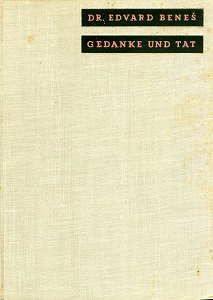
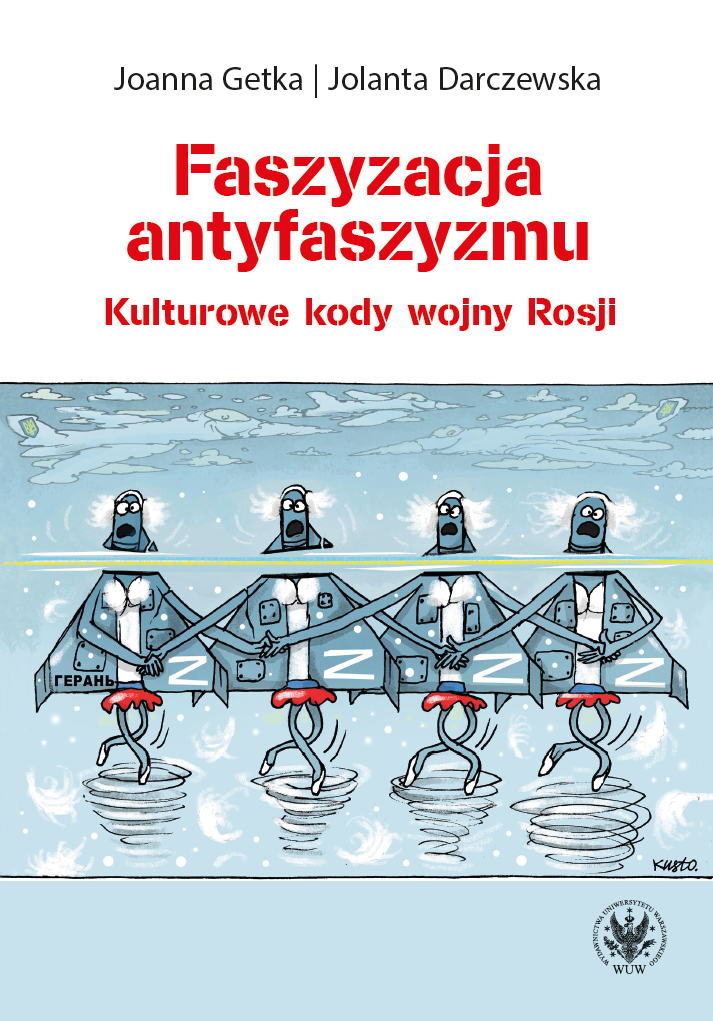
This book, which builds upon our previous volume „Rus’ Abducted? Russia’s War over the Identity of Ukraine”, offers a clear explanation of complex mechanisms of Russia’s war against the West, along with its methods used in both the virtual and physical spaces. The book also lays bare the mechanism of power in Russia, especially her constant eagerness to provoke armed conflicts and wars. This longue durée process requires a continuous renewal and adjustment of stereotypical confrontation scenarios, which results in collisions of meanings, associated as these are with the imperialist symbolic order being bent to fit the moment’s needs.
More...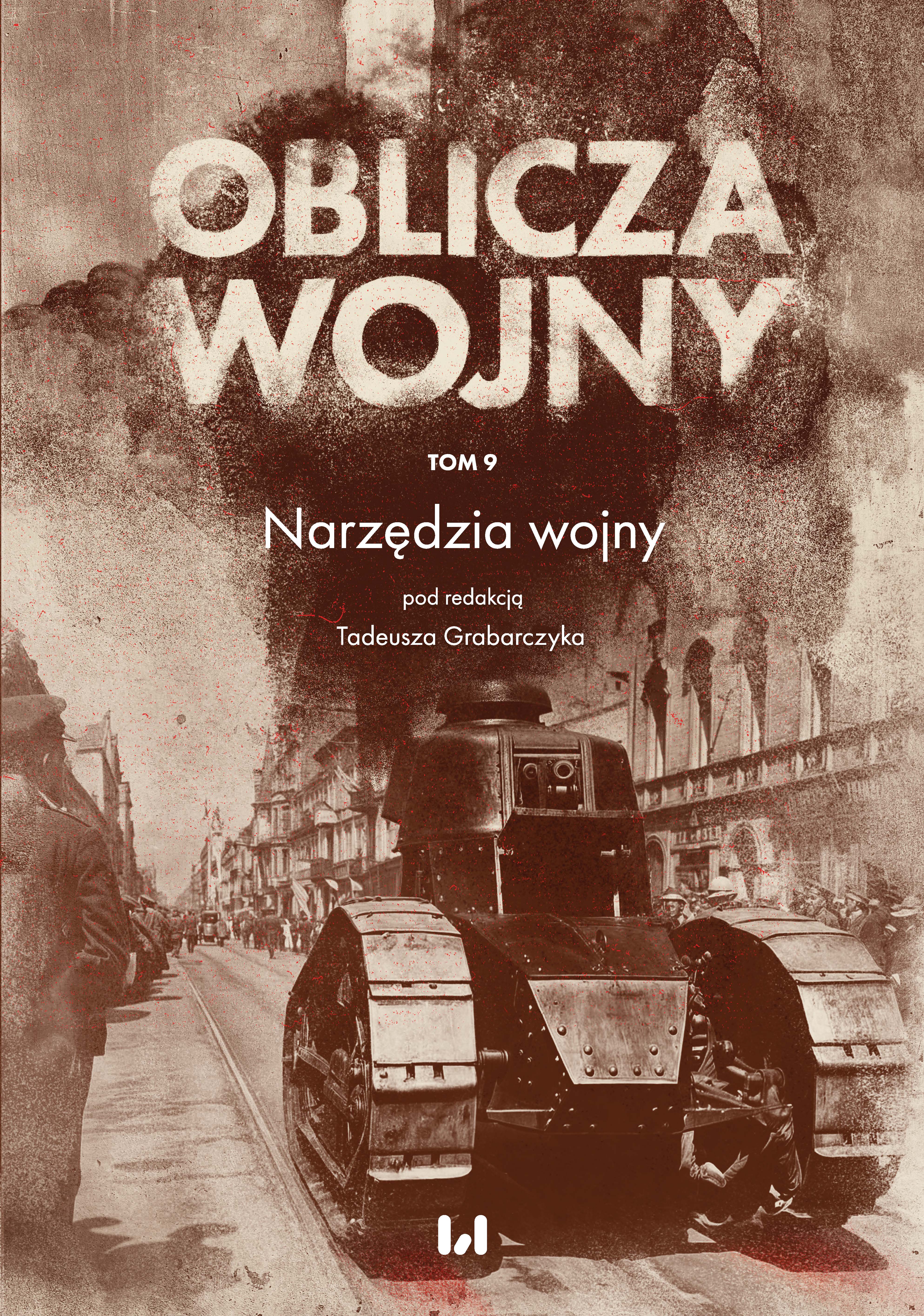
Oblicza Wojny is a series published by the Lodz University Press since 2020, dedicated to military conflicts throughout the centuries. The ninth volume of this series is titled Tools of War. When thinking about tools used during wars, various types of weaponry and armament come to mind, and this is precisely the subject matter of the texts published in this volume. The discussions include fortifications in the Battle of Dyrrachium in 48 BCE, the armament of knights from the royal retinues of Polish kings in the second half of the 15th century, and the weaponry amassed in the arsenals of Krakow in the 17th century. Subsequent articles concern the 20th century, highlighting the use of armored trains in the Polish-Bolshevik War of 1919-1921, the fate of the Polish 1st Tank Regiment at the end of World War I, Irish guerrilla warfare in the years 1919-1921, armament production in Poland before 1939, and aircraft used during World War II. The volume also includes an article on a rarely discussed topic by historians, which is the equipment of the Polish military from 1945 to 1989. The volume concludes with an article dedicated to attempts to create an army of the League of Arab States in 21st century. The authors are professional historians, and their texts are based on thorough analysis of sources.
More...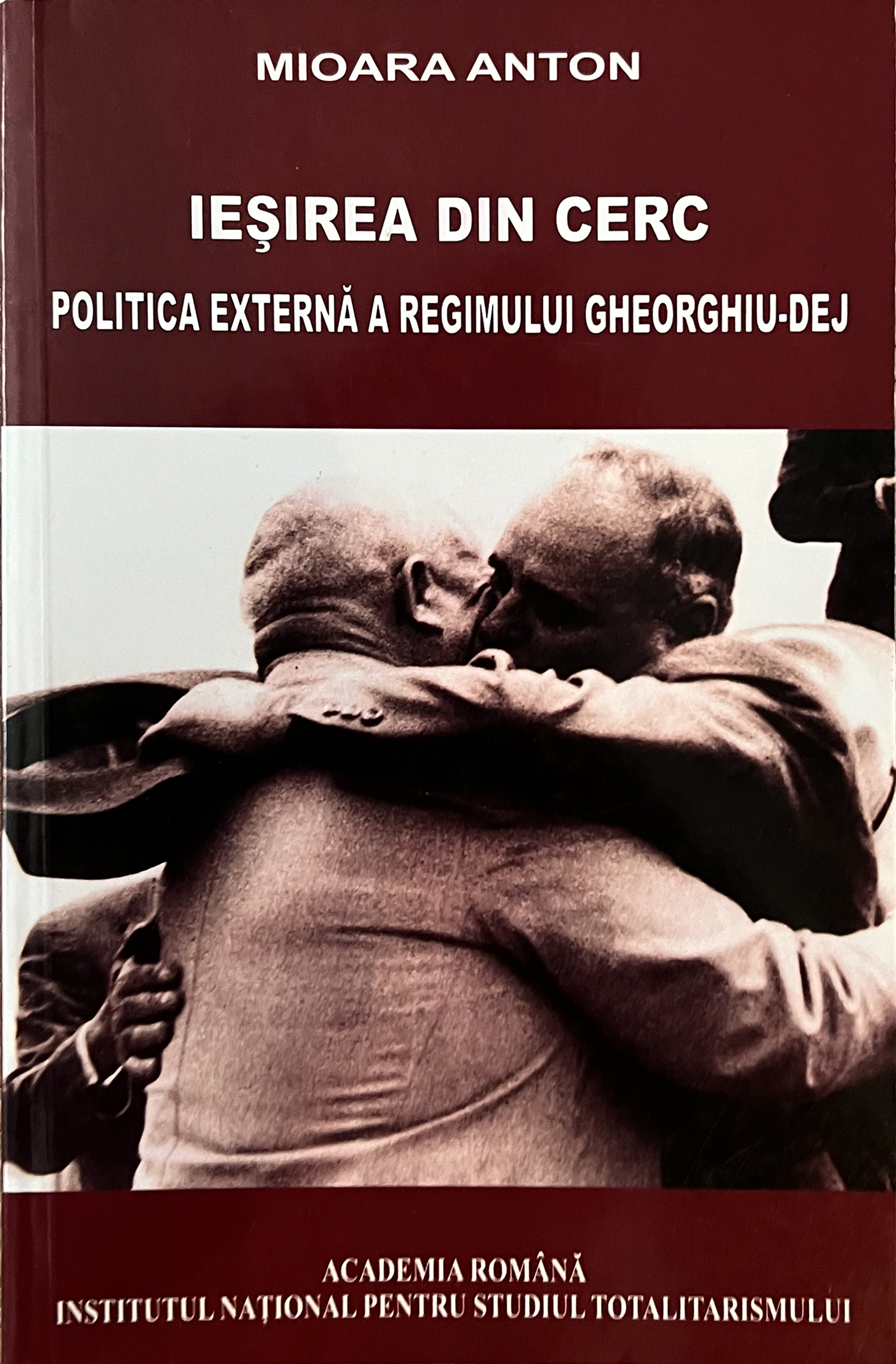
Mioara Anton, who has already stood out as one of the most authoritative representatives of the "new wave" of Romanian historiography, assumed the task, not easy, of providing an assessment of the Romanian-Soviet relations in the first two post-war decades through the prism of mutations produced from the model vassal stage to that of rebel ally. The work is both the result of the critic takeover and the integration of known historical sources and of the studies and works on the topic addressed directly, but also of their own and substantial research in the archives. The result was materialized in a synthesis work, by dimensions, but which excels by the number and quality of the original sources and by the originality of its structure and the accents put in the analysis. The author does not propose a work on the whole of the Romanian-Soviet relations, premature, given the current state of knowledge of sources and the stage of special research, but an incursion into the evolution of the relations between the political regimes in Romania and the Soviet Union through the prism of the perception and reaction of the communist leaders in Bucharest – first of all, Gheorghiu-Dej – towards the directives of the Kremlin. Mioara Anton thus offers both specialists and a wide circle of researchers the opportunity to know the essential segment of the Romanian-Soviet relations, as well as the necessary guide for the correct deciphering of the struggle for power control within the communist regime in Romania. Among the topics covered: Romania and the Soviet-Yugoslav schism; Khrushchev's secret report, withdrawal of Soviet troops, disputes with the Soviet Union in CAER, Khrushchev's visit to Romania in 1962, Romania's opening to the West, April 1964 declaration.
More...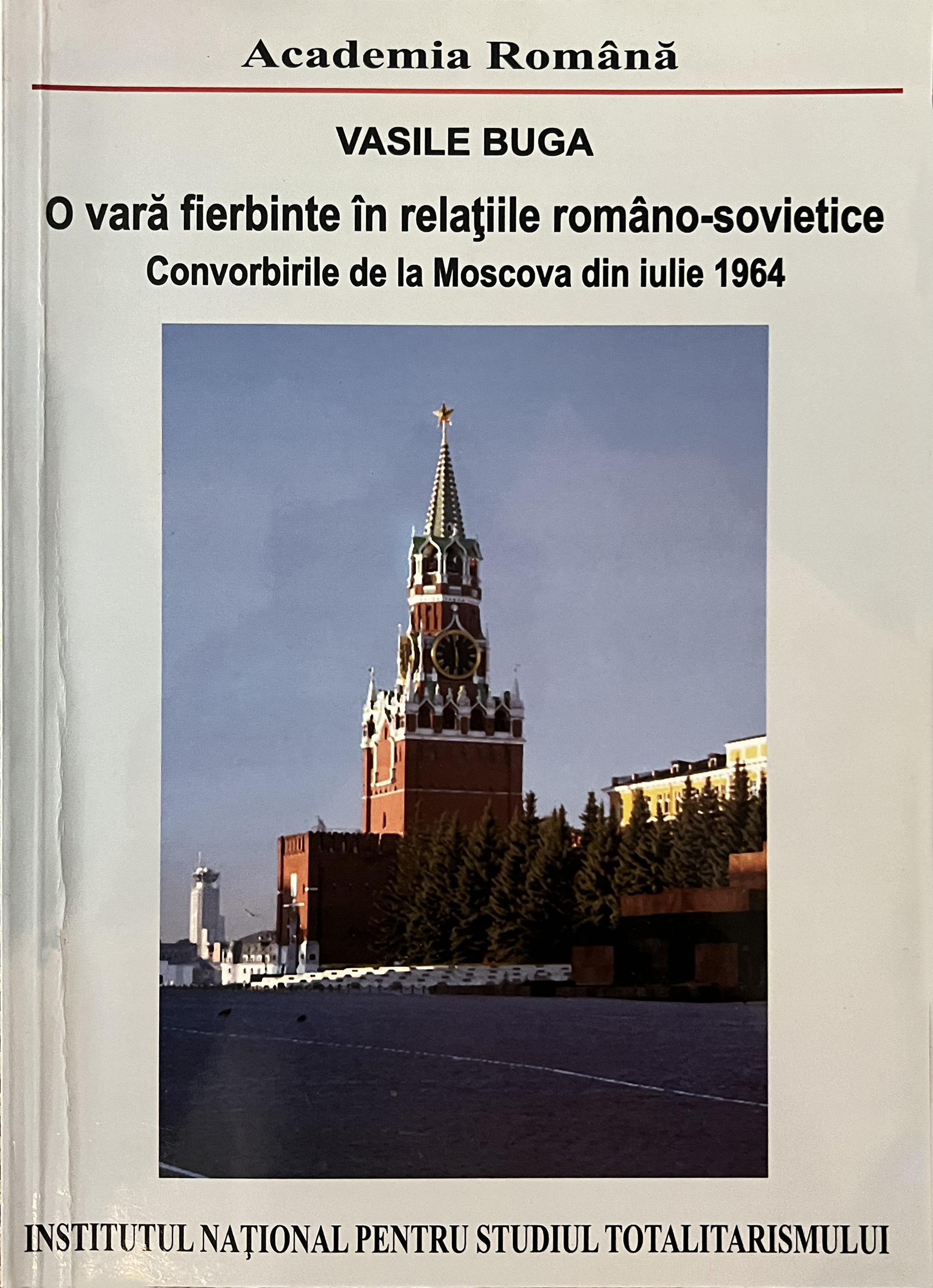
This volume includes the transcript of the conversations held in Moscow between 7-14 July 1964 between the delegation of the Romanian Workers Party (RWP), led by Ion Gheorghe Maurer, member of the Political Bureau of the Central Committee of the RWP, president of the Council of Ministers of the Romanian people's Republic, and the delegation of the Communist Party of the Soviet Union (CPSU), led by Nikolai V. Podgorny, member of the C.C. Presidium, and the transcript of the discussion held on the occasion of the reception of the Romanian delegation by Nikita S. Khrushchev, First Secretary of the C.C. of the CPSU, chairman of the Council of Ministers of the USSR. The author's interventions in the text were minimal, being dictated by the need to comply with the current spelling rules. The editor included in the volume the letters that preceded the organization of the visit of the Romanian delegation to Moscow, as well as the note of problems on the agenda of the Romanian-Soviet relations that the RWP delegation wanted to address in talks with the Soviet side.
More...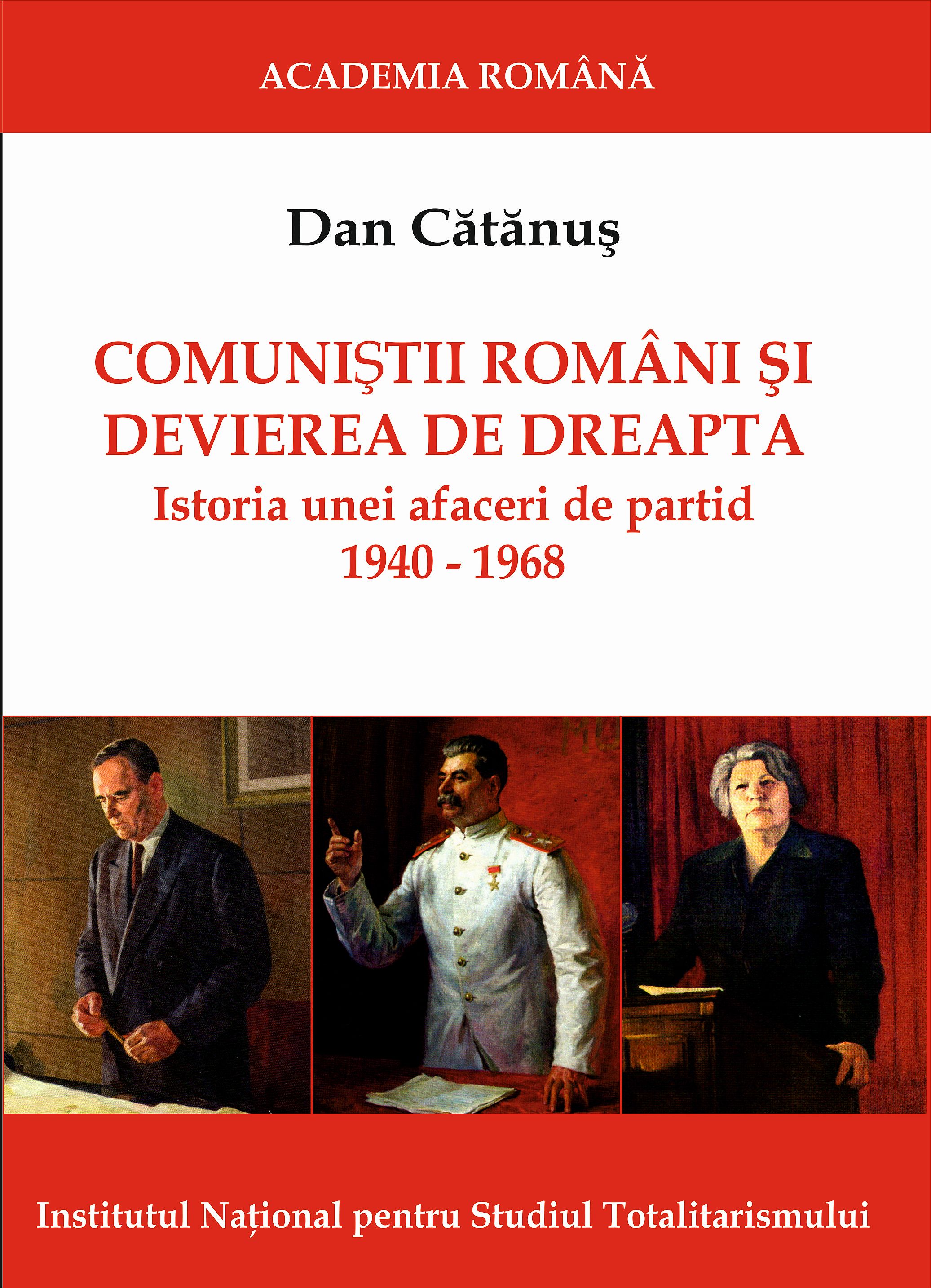
The volume analyzes the origin, evolution and consequences of this controversial episode of the history of Romanian communism: "the right-wing deviation". In 1952, Gheorghiu-Dej accused his main opponents - Ana Pauker, Vasile Luca and Teohari Georgescu – of "right-wing deviation" and removed them from the party leadership. The whole affair was carried out with the direct involvement of Stalin, from its debut to the final decision. The reprisals that followed were not limited only to the three "deviators", but also encompassed, in ever wider circles, their relatives, friends, more or less close collaborators, reaching even vast social segments considered to have been protected by the former leaders. The unmasking of the "right-wing deviation" in the Romanian Workers Party in 1952 was only the end of a deeper business that was rooted deep in the past. The story is fascinating, because, following the thread of rivalry that has been created since the period of illegality between the future protagonists of the struggle for pre-eminence in the party, we discover personal stories, controversial episodes of the communist movement before and after august 23, 1944. The second leading thread, permanently present, is that of the relationship with Moscow, in its double hypostasis: of direct involvement, through indications masked in tips and suggestions, but also by transforming the Soviet factor into a book that the Romanian communist leaders each tried to play as best they could.
More...
The book deals with some particularly important aspects of Romania's international relations in the interwar period, a problem centered on the years of the fourth decade, subject to research before and after 1989. From the beginning, the author insists extensively on what were the general features of the Romanian-Soviet relations, starting from the ideas and beliefs in the perspective of normal and civilized relations, which were found plenary in the conference of 1930, under the beautiful and expressive title "peace dynamics", and which testified to an evolutionary vision in the future and the hope of peace and understanding between nations, unfortunately countered by the actions of the Kremlin and then by those of Berlin. As for the general features of the Romanian-Soviet relations, they stood under the sign of Russian intransigence in the Bessarabia issue, tense, contorted, contradictory, with flows and ebbs, with blackmail and threats, until the resumption of diplomatic relations in June 1934. The author deals extensively with the origins of the Bessarabia problem, focusing on the circumstances, conditions and immediate actions of the historical event, as well as portraying the framework and how the initiation of the Romanian-Soviet negotiations was reached. The book is a contribution to the fuller, more documented, more correct and more objective knowledge of a distinct period in the contemporary history of Romania, being built on an excellent, rich information, in which the archival document is in a privileged position.
More...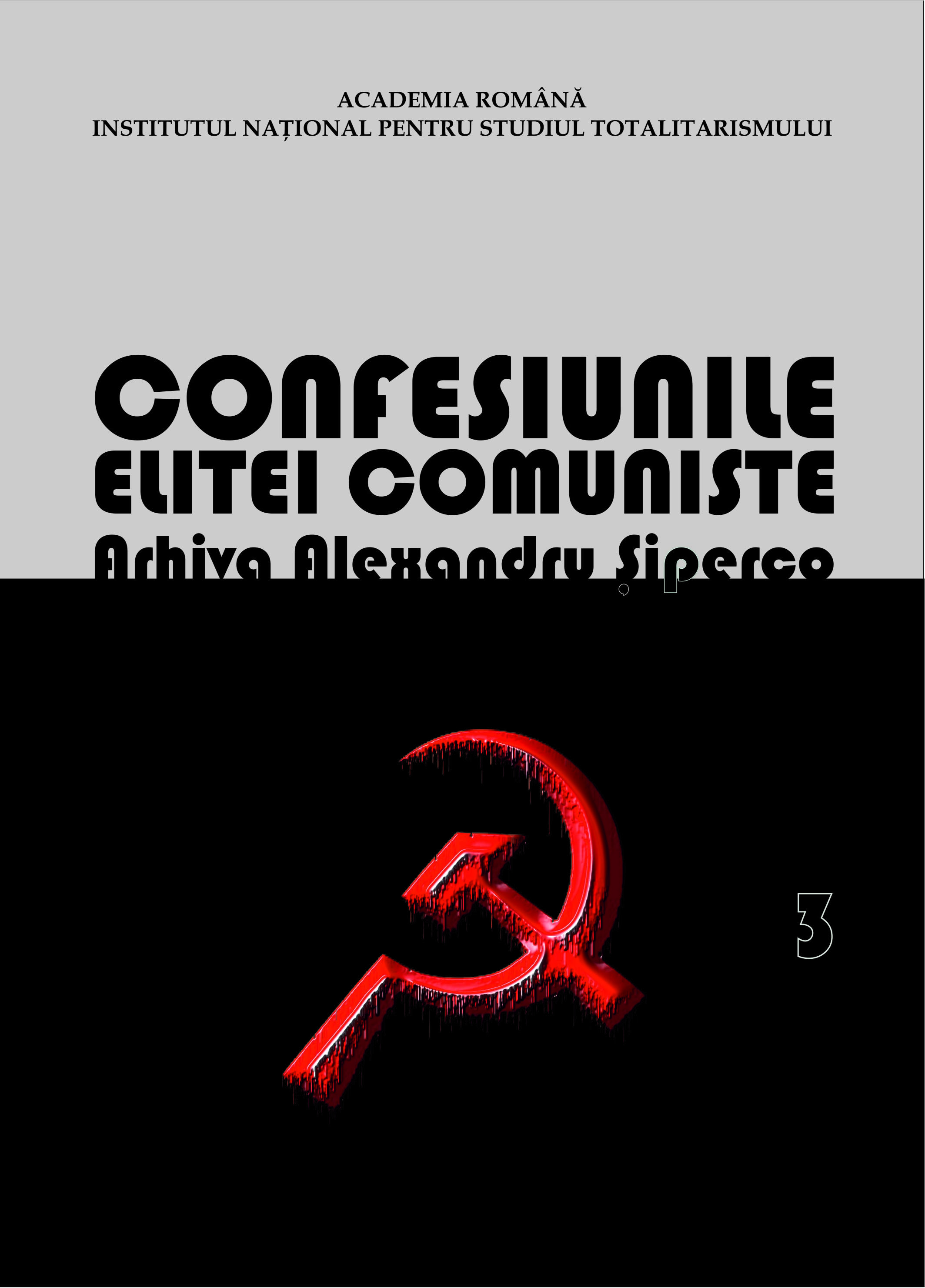
Starting with the ’70s until the revolution of December 1989, Alexandru Siperco conducted several hundred unofficial interviews, totaling thousands of pages, with 350 members and sympathizers from illegality of the Romanian Communist Party (RCP) – among them many former members of the Communist nomenklatura or of the repression apparatus during the Gheorghiu-Dej regime – but also with representatives of former historical parties, including Corneliu Coposu, Ioan Hudita and Camil Demetrescu. No one, neither in Romania nor in the rest of the states of the former communist bloc, has initiated and even less has managed to achieve such an approach that concerns the uncosmitized history of communism. For Alexandru Siperco, the determinant was his desire to know as much as possible of the period between April 4, 1944, and the moment of March 19, 1965, the death of Gheorghiu-Dej. From the interviews given to Alexandru Siperco are not missing events such as: the act of august 23; actions for the conquest of power; liquidation of the political opposition; the struggle for power in the RCP and its consequences; collectivization and monetary reform; the role of Soviet advisers; the activity of repressive bodies; the regime in communist prisons; relations with Moscow leaders; the Rajk, Slansk and Kostov trials; foreign policy; blackmail, betrayals, assassinations; friends and rivals. There are also memories of illegals regarding the period of political detention, the Civil War in Spain, the French Resistance and the political emigration to the U.S.S.R. The testimonies present in this volume: Ladislau Ady, Ronea Gheorghiu, Piotr Goncearuc, Solomon Graur, Octavian Groza, Charlotta Gruia, Nicolae Guina, Alexandru Iacob, Mircea Ioanid, Leon Petre Iosif, Dumitru Ivanovici, Thea Kaplan, Lev Kotlear, Corneliu Leu, Mihail Levente, Aurel Lieblich, Petre Lupu, Manole H. Manole, Ofelia Manole, Vladimir Mazuru, Corneliu Manescu, Radu Manescu, Beno Meirovici, Ilca Melinescu, Eduard Mezincescu, David Mihail, Vasile Modoran, Nicolae Moraru.
More...